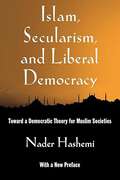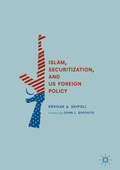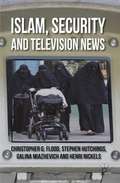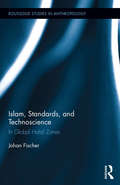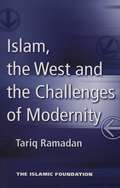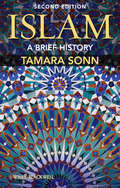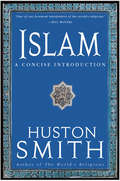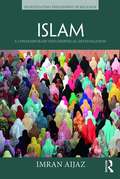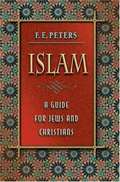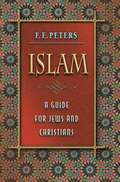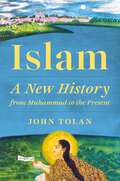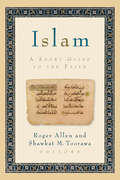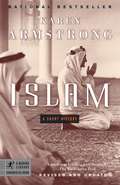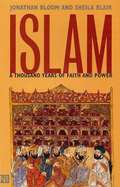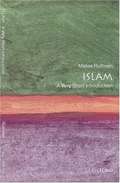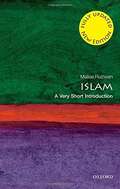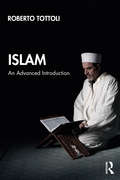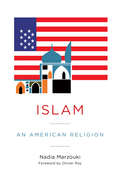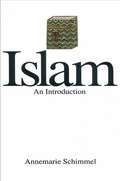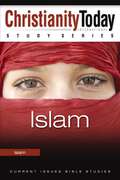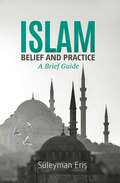- Table View
- List View
Islam, Secularism and Nationalism in Modern Turkey: Who is a Turk? (Routledge Studies in Middle Eastern History)
by Soner CagaptayIt is commonly believed that during the interwar period, Kemalist secularism successfully eliminated religion from the public sphere in Turkey, leaving Turkish national identity devoid of religious content. However, through its examination of the impact of the Ottoman millet system on Turkish and Balkan nationalisms, this book presents a different view point. Cagaptay demonstrates that the legacy of the Ottomon millet system which divided the Ottoman population into religious compartments called millets, shaped Turkey’s understanding of nationalism in the interwar period. Providing a compelling examination of why and how religion shapes national identity in Turkey and the Balkans the book covers topics including: * Turkish nationalism* the Ottoman legacy* Kemalist citizenship policies and immigration* Kurds, Muslims and Jews and the ethno-religious limits of Turkishness. Incorporating documents from untapped Turkish archives, this book is essential reading for scholars and students with research interests in Turkey, Turkish nationalism and Middle East history.
Islam, Secularism, and Liberal Democracy
by Nader HashemiIslam's relationship to liberal-democratic politics has emerged as one of the most pressing and contentious issues in international affairs. In Islam, Secularism, and Liberal Democracy, Nader Hashemi challenges the widely held belief among social scientists that religious politics and liberal-democratic development are structurally incompatible. This book argues for a rethinking of democratic theory so that it incorporates the variable of religion in the development of liberal democracy. In the process, it proves that an indigenous theory of Muslim secularism is not only possible, but is a necessary requirement for the advancement of liberal democracy in Muslim societies.
Islam, Securitization, and US Foreign Policy
by Erdoan A. ShipoliThis book argues that Islam has been securitized in US foreign policy, especially during the W. Bush administration when it was increasingly portrayed as the ultimate “other.” This securitization was realized through the association of Islam with unique security threats in speeches of foreign policy and national security. By analyzing the four recent US presidents’ discourses on Islam, this work sheds light on how they viewed Islam and addresses the following questions: How do we talk about Islam, its place and relationship within the context of US security? How does the language we use to describe Islam influence the way we imagine it? How is Islam constructed as a security issue?
Islam, Security and Television News
by Christopher Flood Stephen Hutchings Galina Miazhevich Henri C. NickelsFocusing on British, French and Russian television news coverage of Islam as a security threat, this book provides the first comparative account of how television broadcasting in different geo- and socio-political environments integrates discourses on Islam into nationally oriented, representational systems.
Islam, Standards, and Technoscience: In Global Halal Zones (Routledge Studies in Anthropology #28)
by Johan FischerHalal (literally, "permissible" or "lawful") production, trade, and standards have become essential to state-regulated Islam and to companies in contemporary Malaysia and Singapore, giving these two countries a special position in the rapidly expanding global market for halal products: in these nations state bodies certify halal products as well as spaces (shops, factories, and restaurants) and work processes, and so consumers can find state halal-certified products from Malaysia and Singapore in shops around the world. Building on ethnographic material from Malaysia, Singapore, and Europe, this book provides an exploration of the role of halal production, trade, and standards. Fischer explains how the global markets for halal comprise divergent zones in which Islam, markets, regulatory institutions, and technoscience interact and diverge. Focusing on the "bigger institutional picture" that frames everyday halal consumption, Fischer provides a multisited ethnography of the overlapping technologies and techniques of production, trade, and standards that together warrant a product as "halal," and thereby help to format the market. Exploring global halal in networks, training, laboratories, activism, companies, shops and restaurants, this book will be an essential resource to scholars and students of social science interested in the global interface zones between religion, standards, and technoscience.
Islam, Youth, and Modernity in the Gambia: The Tablighi Jama'at
by Marloes JansonThis monograph deals with the sweeping emergence of the Tablighi Jama'at a transnational Islamic missionary movement that has its origins in the reformist tradition that emerged in India in the mid-nineteenth century in the Gambia in the past decade. It explores how a movement that originated in South Asia could appeal to the local Muslim population youth and women in particular in a West African setting. By recording the biographical narratives of five Gambian Tablighis, the book provides an understanding of the ambiguities and contradictions young people are confronted with in their (re)negotiation of Muslim identity. Together these narratives form a picture of how Gambian youth go about their lives within the framework of neo-liberal reforms and renegotiated parameters informed by the Tablighi model of how to be a true Muslim, which is interpreted as a believer who is able to reconcile his or her faith with a modern lifestyle.
Islam, the State, and Political Authority
by Asma AfsaruddinThe essays in this volume, written by recognized experts, deal with some of the most critically important topics concerning Islam and politics in both the pre-modern and modern periods. Each chapter provides a historically grounded and in-depth discussion of issues as diverse as the nature of government, the relationship between politics and theology, Shi'i conceptions of statecraft, notions of public duty, and the compatibility of Islam and democratic governance. Both specialists and interested readers will benefit from the volume's broad scope and thorough consideration of a variety of issues in Islamic political thought and practice.
Islam, the West and the Challenges of Modernity
by Tariq RamadanTariq Ramadan attempts to demonstrate, using sources which draw upon Islamic thought and civilization, that Muslims can respond to contemporary challenges of modernity without betraying their identity. The book argues that Muslims, nurished by their own points of reference, can approach the modern epoch by adopting a specific social, political, and economic model that is linked to ethical values, a sense of finalities and spirituality. Rather than a modernism that tends to impose Westernization, it is a modernity that admits to the pluralism of civilizations, religions, and cultures.Table of Contents:ForewordIntroductionHistory of a ConceptThe Lessons of HistoryPart 1: At the shores of Transcendence: between God and ManPart 2: The Horizons of Islam: Between Man and the CommunityPart 3: Values and Finalities: The Cultural Dimension of the Civilizational Face to FaceConclusionAppendixIndexTariq Ramadan is a professor of Islamic Studies at the University of Oxford and a visiting professor in Identity and Citizenship at Erasmus University. He was named by TIME Magazine as one of the one hundred innovators of the twenty-first century.
Islam: A Brief History (Wiley Blackwell Brief Histories Of Religion Ser.)
by Tamara SonnReflecting recent global developments, the second edition of this illuminating introduction to Islamic history expands its coverage of the Qur’an, Sufism, and Muslim views on human rights, including the rights of women. An expanded new edition of this concise, illuminating introduction to Islam, written by one of the field’s leading scholars Spans Islamic history from the life of Muhammad and the birth of Islamic ideals, through Islam’s phenomenal geographical expansion and cultural development, to the creation of modern states and its role in today’s global society Features expanded coverage of the Qur’an, Sufism, and Muslim views on human rights, including the rights of women Includes fascinating vignettes of Islamic life, representing mainstream Muslim viewpoints on issues of global concern Explores the complex interrelationships of cultural, political, and ideological developments woven throughout Islamic history, drawing on specific examples including current developments in Pakistan
Islam: A Concise Introduction
by Huston SmithOriginally titled The Religions of Man, this completely revised and updated edition of Smith's masterpiece, now with an engaging new foreword, explores the essential elements and teachings of the world's predominant faiths, including: Hinduism, Buddhism, Confucianism, Taoism, Islam, Judaism, Christianity, and the native traditions of the Americas, Australia, Africa, and Oceania. Emphasizing the inner -- rather than institutional -- dimensions of these religions, Smith devotes special attention to Zen and Tibetan Buddhism, Sufism, and the teachings of Jesus. He convincingly conveys the unique appeal and gifts of each of the traditions and reveals their hold on the human heart and imagination.
Islam: A Contemporary Philosophical Investigation (Investigating Philosophy of Religion)
by Imran AijazIslam as a religion and a way of life guides millions of people around the world and has a significant impact on worldly affairs. To many Muslims, however, a philosophical understanding or assessment of Islamic belief is seen as a feeble and religiously inappropriate attempt to understand matters that are beyond rational comprehension. Islam: A Contemporary Philosophical Investigation explores this issue in detail, by guiding readers through a careful study of the relationship between faith and reason in Islam. In particular, it pays close attention to religious objections to philosophizing about Islam, arguments for and against Islamic belief, and the rationality of Islamic belief in light of contemporary philosophical issues, such as problems of religious diversity, evil and religious doubt. This text is ideal for upper-level undergraduates and graduate students seeking an objective, philosophical introduction to Islam, a subject of increasing interest in classrooms around the world.
Islam: A Guide for Jews and Christians
by F. E. PetersThe Quran is a sacred book with profound, and familiar, Old and New Testament resonances. And the message it promulgated, Islam, came of age during an extraordinarily rich era of interaction among monotheists. Jews, Christians, and Muslims not only worshipped the same God, but shared aspirations, operated in the same social and economic environment, and sometimes lived side by side, indistinguishable by language, costume, or manners. Today, of course, little of this commonality is apparent, and Islam is poorly understood by most non-Muslims. Entering Islam through the same biblical door Muhammad did, this book introduces readers with Christian or Jewish backgrounds to one of the world's largest, most active, and--in the West--least understood religions. Frank Peters, one of the world's leading authorities on the monotheistic religions, starts with the central feature of Muslim faith and life: the Quran. Across its pages move Adam, Noah, Abraham, David, Solomon, John the Baptist, Jesus, and the Virgin Mary. The Quran contains remarkably familiar accounts of Genesis, the Flood, Exodus, the Virgin Birth, and other biblical events. But Peters also highlights Muhammad's very different use of Scripture and explains those elements of the Quran most alien to Western readers, from its didactic passages to its remarkable poetry. Peters goes on to cogently explain Islam's defining features--including the significance of Mecca, the manner of Muhammad's revelations, and the creation of the unique community of Muslims, all in relation to the Judeo-Christian tradition. He compares Jesus and Muhammad, describes Islamic commandments and rituals, details the structures of Sunni and Shi'ite communities, and lays out central Islamic beliefs on war, women, mysticism, and martyrdom. The result is a crucial and extremely accomplished book that offers Western readers a professional yet highly accessible understanding of Islam, and at a time when we need it most.
Islam: A Guide for Jews and Christians (Princeton Classic Editions Ser.)
by Francis Edward PetersThe Quran is a sacred book with profound, and familiar, Old and New Testament resonances. And the message it promulgated, Islam, came of age during an extraordinarily rich era of interaction among monotheists. Jews, Christians, and Muslims not only worshipped the same God, but shared aspirations, operated in the same social and economic environment, and sometimes lived side by side, indistinguishable by language, costume, or manners. Today, of course, little of this commonality is apparent, and Islam is poorly understood by most non-Muslims. Entering Islam through the same biblical door Muhammad did, this book introduces readers with Christian or Jewish backgrounds to one of the world's largest, most active, and--in the West--least understood religions. Frank Peters, one of the world's leading authorities on the monotheistic religions, starts with the central feature of Muslim faith and life: the Quran. Across its pages move Adam, Noah, Abraham, David, Solomon, John the Baptist, Jesus, and the Virgin Mary. The Quran contains remarkably familiar accounts of Genesis, the Flood, Exodus, the Virgin Birth, and other biblical events. But Peters also highlights Muhammad's very different use of Scripture and explains those elements of the Quran most alien to Western readers, from its didactic passages to its remarkable poetry. Peters goes on to cogently explain Islam's defining features--including the significance of Mecca, the manner of Muhammad's revelations, and the creation of the unique community of Muslims, all in relation to the Judeo-Christian tradition. He compares Jesus and Muhammad, describes Islamic commandments and rituals, details the structures of Sunni and Shi'ite communities, and lays out central Islamic beliefs on war, women, mysticism, and martyrdom. The result is a crucial and extremely accomplished book that offers Western readers a professional yet highly accessible understanding of Islam, and at a time when we need it most.
Islam: A New History from Muhammad to the Present
by John TolanA concise new narrative history of Islam that draws on the transformative insights of recent research to emphasize the diversity and dynamism of the traditionToday&’s Muslim world is in upheaval: legalists and mystics engage in intense debates, radical groups invoke Sharia, Muslim immigrants in the West face prejudice and discrimination, and Muslim feminists advocate new interpretations of the Koran. At the same time, Islam is mischaracterized as unitary and unchanging by people ranging from right-wing Western politicians claiming that Islam is incompatible with democracy to conservative Muslims dreaming of returning to the golden age of the prophet. Against this contentious backdrop, this book provides an essential and timely new history of the religion in all its astonishing richness and diversity as it has been practiced by Muslims around the world, from seventh-century Mecca to today.Most popular histories of Islam continue to repeat conventional pietistic accounts. In contrast, John Tolan draws on decades of new historical research that has transformed knowledge of the origins and development of the Muslim faith. He shows how the youngest of the three great monotheisms arose in close contact with Jewish, Christian, and other religious traditions in a mixture of cultures, including Arab, Greek, Persian, and Turkish; how Islam spread across an enormous territory encompassing hundreds of languages and cultures; how Muslims have forged widely different beliefs and practices over fourteen centuries; and how Islamic history provides crucial context for understanding contemporary debates in the Muslim world.At a time when much talk about Islam is filled with misunderstanding, stereotypes, and bias, this book provides a fresh and lucid portrait of the continuous and ongoing transformations of a religion of tremendous variety and complexity.
Islam: A Short Guide to the Faith
by Roger Allen Shawkat M ToorawaIn this straightforward and authoritative collection of fifteen essays -- each by a different, specialized expert in the field -- readers will encounter all the major elements of Islam, including its history, its beliefs, its practices, and its interactions, notably with Christianity, Judaism, and the modern world. Islam: A Short Guide to the Faith will inform and enlighten all who wish to better understand this increasingly influential world religion.Contributors:Roger AllenRuba Kana'anAhmet T. KaramustafaBruce B. LawrencePaul LöfflerJoseph E. LowryScott C. LucasJon McGinnisTahera QutbuddinAbdulaziz SachedinaJane I. SmithMark N. SwansonShawkat M. ToorawaMark S. WagnerHomayra ZiadAron Zysow
Islam: A Short History (Modern Library Chronicles #2)
by Karen ArmstrongIn the public mind, Islam is a religion of extremes: it is the worlds fastest growing faith; more than three-quarters of the worlds refugees are Islamic; it has produced government by authoritarian monarchies in Saudi Arabia and ultra-republicans in Iran. Whether we are reading about civil war in Algeria or Afghanistan, the struggle for the soul of Turkey, or political turmoil in Pakistan or Malaysia, the Islamic context permeates all these situations. Karen Armstrongs elegant and concise book traces how Islam grew from the other religions of the book, Judaism and Christianity; introduces us to the character of Muhammed; and demonstrates that for much of its history, the religion has been a force for enlightenment that promoted liberties for women and allowed the arts and sciences to flourish. Islam shows how this progressive legacy is today often set aside as the faith struggles to come to terms with the economic and political weakness of most of its believers and with the forces of modernity itself.
Islam: A Thousand Years of Faith and Power
by Jonathan Bloom Sheila S. BlairIn its first thousand years -- from the revelations to Muhammad in the seventh century to the great Islamic empires of the sixteenth -- Islamic civilization flourished. While Europeans suffered through the Dark Ages, Muslims in such cities as Jerusalem, Damascus, Alexandria, Fez, Tunis, Cairo, and Baghdad made remarkable advances in philosophy, science, medicine, literature, and art. This engrossing and accessible book explores the first millennium of Islamic culture, shattering stereotypes and enlightening readers about the events and achievements that have shaped contemporary Islamic civilization. Jonathan Bloom and Sheila Blair examine the rise of Islam, the life of Muhammad, and the Islamic principles of faith. They describe the golden age of the Abbasids, the Mongol invasions, and the great Ottoman, Safavid, and Mughal empires that emerged in their wake. Their narrative, complemented by excerpts of the Koran, poetry, biographies, inscriptions, travel guides, and even a thirteenth-century recipe, concludes with a brief epilogue that takes us to the twentieth century. Colorfully illustrated, this book is a wonderful introduction to the rich history of a civilization that still radically affects the world.
Islam: A Very Short Introduction
by Malise RuthvenOxford's Very Short Introductions series provides trenchant and provocative -- yet always balanced and complete -- discussions of the central issues in a given discipline or field. Every Very Short Introduction gives a readable evolution of the subject in question, demonstrating how the subject developed and how it influenced society.
Islam: A Very Short Introduction (Very Short Introductions Ser.)
by Malise RuthvenIslam features widely in the news, often in its most militant versions. But few people in the non-Muslim world really understand the nature of Islam, both as Ideology and religion.Islam: A Very Short Introductionoffers essential insight into the structure and beliefs of this major world religion. Malise Ruthven answers fundamental questions about the nature and scope of Islam such as why the greatest Jihad (holy war) is now against the enemies of Islam, rather than the struggle against evil, why Islam has such major divisions between movements such as the Shiis, the Sunnis, and the Wahhabis, and how the Sharia (Islamic law) has become such an important aspect of Islamic life. In addition, he prompts further questioning into the ideas of Islamic resurgence as both an old and new concept, whether or not women can find fulfillment and equality within an Islamic framework, and the sort of problems facing Islam and its confrontations with the modern world. Offering fresh insights and new information,Islam: A Very Short Introductionprovides a much needed discussion of Islam's past, present, and future, and its place in modern world religions.
Islam: An Advanced Introduction
by Roberto TottoliExploring complex relations between Muslim visions and critical stances, this textbook is a compact introduction to Islam, dealing with the origins of its forms, from early developments to contemporary issues, including religious principles, beliefs and practices. The author’s innovative method considers the various opposing theories and approaches between the Islamic tradition and scholars of Islam. Each topic is accompanied by up-to-date bibliographical references and a list of titles for further study, while an exhaustive glossary includes the elementary notions to allow in-depth study. Part I outlines the two founding aspects, the Qur’an and Prophet Muhammad, highlighting essential concepts, according to Islamic religious discourse and related critical issues. In Part II the emergence of the religious themes that have characterised the formation of Islam are explored in terms of historical developments. Part III, on contemporary Islam, examines the growth of Islam between the end of the Middle Ages and the beginning of the modern age. Advanced readers, already familiar with the elementary notions of Islam and religious studies will benefit from Islam that explores the development of religious discourse in a historical perspective. This unique textbook is a key resource for post-graduate researchers and academics interested in Islam, religion and the Middle East.
Islam: An American Religion (Religion, Culture, and Public Life #27)
by Nadia MarzoukiIslam: An American Religion demonstrates how Islam as formed in the United States has become an American religion in a double sense—first through the strategies of recognition adopted by Muslims and second through the performance of Islam as a faith.Nadia Marzouki investigates how Islam has become so contentious in American politics. Focusing on the period from 2008 to 2013, she revisits the uproar over the construction of mosques, legal disputes around the prohibition of Islamic law, and the overseas promotion of religious freedom. She argues that public controversies over Islam in the United States primarily reflect the American public's profound divisions and ambivalence toward freedom of speech and the legitimacy of liberal secular democracy.
Islam: An Introduction
by Annemarie SchimmelIt is a splendid introduction—carefully researched and comprehensive, yet readable. It corrects many popular and erroneous notions about Islam that prevail in non-Muslim societies. For the general reader there are many profound insights of great consequence, for example, the passages on women, marriage, and inheritance, or the section on jihad, nearly always completely misunderstood in the press.
Islam: An Introduction to Religion, Culture, and History
by James A. BeverleyThe Christian Today Study Series delves into today's vital cultural issues to get to the heart of what these topics mean to you.Each 8-week study is based on articles written by some of today's leading Christian authors and published by the Christianity Today magazines. These remarkable studies will foster deep, authentic, and relevant discussion that will challenge and grow any small group.Islam will take on a variety of topics, such as: Violence & Peace in IslamUnderstanding Islamic BeliefsUnderstanding JihadReaching Out to Muslim Neighbors & FriendsBased on articles by a variety of authors, such as:Stan GuthrieWendy Murray ZobaMiriam Adeney
Islam: Area 1 Religion And Ethics Through Christianity, Area 2 Religion, Peace And Conflict Through Islam
by Victor W WattonOpen this book and you will Discover Islamic worship Learn about Muhammed Explore the Qur'an Understand contemporary issues
Islam: Belief And Practice
by Suleyman ErisThis book is intended to open a small window into the Islamic belief and practice in order to assist beginners desiring to learn the basics of Islam. It covers the pillars of faith and the pillars of Islamic practice including prayer, fasting, almsgiving, and hajj.

